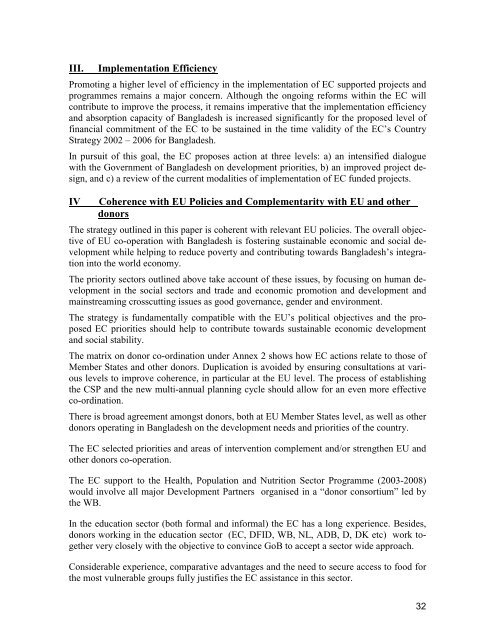EC Country Strategy Paper for Bangladesh 2002-2006
EC Country Strategy Paper for Bangladesh 2002-2006
EC Country Strategy Paper for Bangladesh 2002-2006
Create successful ePaper yourself
Turn your PDF publications into a flip-book with our unique Google optimized e-Paper software.
III. Implementation Efficiency<br />
Promoting a higher level of efficiency in the implementation of <strong>EC</strong> supported projects and<br />
programmes remains a major concern. Although the ongoing re<strong>for</strong>ms within the <strong>EC</strong> will<br />
contribute to improve the process, it remains imperative that the implementation efficiency<br />
and absorption capacity of <strong>Bangladesh</strong> is increased significantly <strong>for</strong> the proposed level of<br />
financial commitment of the <strong>EC</strong> to be sustained in the time validity of the <strong>EC</strong>’s <strong>Country</strong><br />
<strong>Strategy</strong> <strong>2002</strong> – <strong>2006</strong> <strong>for</strong> <strong>Bangladesh</strong>.<br />
In pursuit of this goal, the <strong>EC</strong> proposes action at three levels: a) an intensified dialogue<br />
with the Government of <strong>Bangladesh</strong> on development priorities, b) an improved project design,<br />
and c) a review of the current modalities of implementation of <strong>EC</strong> funded projects.<br />
IV Coherence with EU Policies and Complementarity with EU and other<br />
donors<br />
The strategy outlined in this paper is coherent with relevant EU policies. The overall objective<br />
of EU co-operation with <strong>Bangladesh</strong> is fostering sustainable economic and social development<br />
while helping to reduce poverty and contributing towards <strong>Bangladesh</strong>’s integration<br />
into the world economy.<br />
The priority sectors outlined above take account of these issues, by focusing on human development<br />
in the social sectors and trade and economic promotion and development and<br />
mainstreaming crosscutting issues as good governance, gender and environment.<br />
The strategy is fundamentally compatible with the EU’s political objectives and the proposed<br />
<strong>EC</strong> priorities should help to contribute towards sustainable economic development<br />
and social stability.<br />
The matrix on donor co-ordination under Annex 2 shows how <strong>EC</strong> actions relate to those of<br />
Member States and other donors. Duplication is avoided by ensuring consultations at various<br />
levels to improve coherence, in particular at the EU level. The process of establishing<br />
the CSP and the new multi-annual planning cycle should allow <strong>for</strong> an even more effective<br />
co-ordination.<br />
There is broad agreement amongst donors, both at EU Member States level, as well as other<br />
donors operating in <strong>Bangladesh</strong> on the development needs and priorities of the country.<br />
The <strong>EC</strong> selected priorities and areas of intervention complement and/or strengthen EU and<br />
other donors co-operation.<br />
The <strong>EC</strong> support to the Health, Population and Nutrition Sector Programme (2003-2008)<br />
would involve all major Development Partners organised in a “donor consortium” led by<br />
the WB.<br />
In the education sector (both <strong>for</strong>mal and in<strong>for</strong>mal) the <strong>EC</strong> has a long experience. Besides,<br />
donors working in the education sector (<strong>EC</strong>, DFID, WB, NL, ADB, D, DK etc) work together<br />
very closely with the objective to convince GoB to accept a sector wide approach.<br />
Considerable experience, comparative advantages and the need to secure access to food <strong>for</strong><br />
the most vulnerable groups fully justifies the <strong>EC</strong> assistance in this sector.<br />
32

















